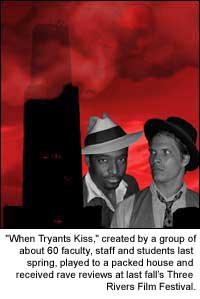Students to Create Feature Films in New Interdisciplinary Project Course
Jonathan Potts
Forget low-budget filmmaking. Think no-budget filmmaking, Carnegie Mellon-style.

Spurred by the success of a film created by a group of about 60 faculty, staff and students last spring, Carnegie Mellon has added a hands-on yearlong project course to its interdisciplinary curriculum that gives students the opportunity to write, direct, act in and produce a feature-length film from scratch.
Twelve students are entered in this year’s class taught by Associate English Professor Sharon Dilworth, Assistant Professor of Dramatic Literature Michael Chemers, Tepper School Associate Teaching Professor Claudia Kirkpatrick and Drama Instructor Shirley Saldamarco.
“Everyone will work on all aspects of the film,” Dilworth says.
The course is called “The Danny Josephs Project” for the now retired English Department business manager who was the driving force behind “When Tyrants Kiss,” a 94-minute film that played to a packed house and received rave reviews at last fall’s Three Rivers Film Festival.
"When Tyrants Kiss” was written by Chemers and directed by creative writer Michael Scotto (HS’04), then president of the Carnegie Mellon Filmmaking Club. The cast and crew consisted almost entirely of Carnegie Mellon students, faculty and staff, and much of the film was shot on campus. Aside from a small grant from the Department of English, the cost of the film was borne by those personally involved in making the picture.
“The film was Danny’s brainchild,” says Chemers. Josephs’ corporate conspiracy tale became the story for Chemer's script that he wrote over winter break.
“He was the guiding vision for this army of fellow dreamers. He kept attracting more and more people to the project, like Kermit the Frog going to Hollywood in “The Muppet Movie,” soon enough he had a legion.”
Josephs modestly takes a different view.
"You lock the two Mikes (Chemers and Scotto) in a room and in six months you’ll have a movie,” he says.
The filmmakers relied on the filmmaking club’s equipment and on wardrobes from the School of Drama. Josephs, the producer, doubled as the caterer and served about 500 meals during the course of the project.
“Things kept going wrong, and we adjusted, and when you have to adjust with no money, you have to be creative,” says Joesphs, who ironically now owns a restaurant in Pittsburgh called “Zooty’s.”
Filming took place in May, and Scotto spent most of the summer editing the film. He would often start his day at 9 a.m. and work until 4 the next morning.
“The fact that there wasn’t any money wasn’t really a challenge. The challenge lay in the sheer brutality of the schedule,” says Scotto, now a graduate student in the English Department’s Literary and Cultural Studies program.
Chemers clearly intends to try to preserve the shoot-from-the-hip energy of that first project. “People need to pull together like we pulled together on ‘When Tyrants Kiss.’ If we had had one instance of ego or selfishness, it would have fallen apart,” he says.
The no-budget filmmaking program hopes to produce a student movie each year. As the program expands, its unofficial founder hopes it will maintain the collaborative spirit that dominated the first project.
“Carnegie Mellon is a rich environment for that kind of creativity and talent,” Josephs says.
This article was adapted from a story that originally appeared in FOCUS, Carnegie Mellon’s faculty and staff newspaper. It was written by Ryan Coon and reprinted with permission by FOCUS editor Lynn Berard.



